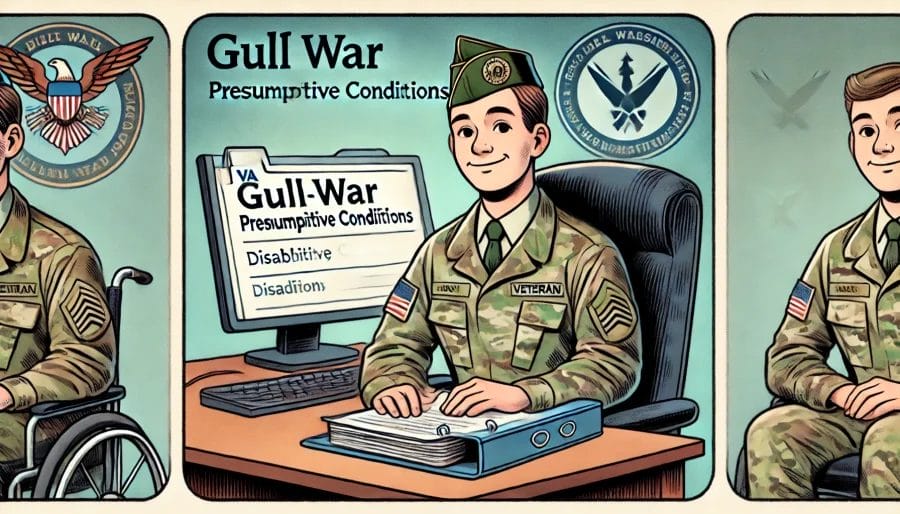The Gulf War, also known as Operation Desert Storm, was a significant conflict that has left lasting impacts on many veterans.
Among these impacts is Gulf War Syndrome, a complex disorder with a variety of symptoms that can severely affect a veteran’s quality of life. Understanding Gulf War presumptives , the associated symptoms, VA disability ratings, and the process for filing claims is crucial for affected veterans seeking the compensation and support they deserve.
What Are Gulf War Presumptive Conditions?
Gulf War presumptives refer to a list of illnesses and disorders that the Department of Veterans Affairs (VA) automatically recognizes as being related to military service in the Gulf War. This presumption simplifies the process for veterans to receive disability compensation without the burden of proving a direct service connection for each condition.
Common Presumptive Conditions
- Gulf War Syndrome (GWS): A chronic multi-symptom disorder affecting veterans who served in the Gulf region.
- Chronic Fatigue Syndrome (CFS): Characterized by persistent fatigue not improved by rest.
- Fibromyalgia: Causes widespread musculoskeletal pain accompanied by fatigue and mood issues.
- Irritable Bowel Syndrome (IBS): Affects the large intestine, leading to cramping, abdominal pain, bloating, gas, and diarrhea or constipation.
- Multiple Sclerosis (MS): A potentially disabling disease of the brain and spinal cord.
For a comprehensive list of presumptive conditions, refer to the VA’s Gulf War Illness page.
AI Powered Chatbot for VA Disability Claims
Learn more about the VA Disability process and get help with our VA Disability Claim Chatbot programmed and trained by AI

Understanding Gulf War Syndrome (GWS)
Gulf War Syndrome is a term used to describe a range of unexplained chronic symptoms reported by veterans of the 1990-1991 Gulf War. Symptoms vary widely but commonly include:
- Fatigue: Persistent and debilitating exhaustion.
- Muscle and Joint Pain: Chronic pain without a clear cause.
- Cognitive Issues: Memory problems, difficulty concentrating, and other cognitive impairments.
- Respiratory Problems: Persistent cough, shortness of breath, and other respiratory issues.
- Gastrointestinal Issues: Including IBS and other digestive problems.
- Skin Rashes: Unexplained rashes that can be persistent and uncomfortable.
According to research by Johns Hopkins Medicine, the exact cause of GWS remains unclear, but factors such as exposure to chemical weapons, pesticides, and other environmental hazards during deployment are suspected.
VA Disability Ratings for Gulf War Presumptives
The VA assigns disability ratings based on the severity of a veteran’s condition and its impact on their ability to work and perform daily activities. These ratings determine the amount of monthly compensation a veteran receives.
Gulf War Syndrome VA Rating
Gulf War Syndrome is evaluated under the VA’s general disability rating system. The rating percentages can range from 10% to 100%, depending on the number and severity of symptoms:
- 10% Rating: Mild symptoms that do not significantly impact daily life.
- 30% Rating: Moderate symptoms causing some impairment in daily activities.
- 60% Rating: Severe symptoms significantly impairing work and daily functions.
- 100% Rating: Total impairment, rendering the veteran unable to work or perform any daily activities.
For detailed information on disability compensation rates, visit the VA’s official compensation rates page.
Secondary Conditions and Their Impact
Veterans with Gulf War Syndrome often develop secondary conditions such as chronic fatigue, fibromyalgia, and IBS. These secondary conditions can lead to additional disability ratings, further increasing the total compensation.
- Dysphagia VA Rating: Difficulty swallowing, which can result from severe GERD or esophagitis.
- Esophagitis VA Rating: Inflammation of the esophagus, often related to acid reflux.
Including secondary conditions in your VA claim can enhance your overall disability rating and compensation. For more information on specific secondary conditions, refer to the VA’s Gulf War Illness page.

Filing a VA Claim for Gulf War Presumptives
Filing a VA claim for Gulf War presumptive conditions involves several steps to ensure that all relevant aspects of your health are accurately represented.
1. Establishing Service Connection
To qualify for disability compensation, you must establish that your conditions are service-connected. For Gulf War presumptives, the VA assumes a service connection if you served in the Gulf War and meet the criteria for the condition.
- Service Records: Provide proof of your service in the Gulf War.
- Medical Evidence: Include comprehensive medical records documenting your diagnosis and treatment.
- Nexus Letter: A statement from a medical professional linking your condition to your military service.
2. Gathering Supporting Documentation
Collect all relevant documents to support your claim, including:
- Medical Records: Both military and civilian records that detail your Gulf War Syndrome diagnosis and treatments.
- Personal Statements: Descriptions of how GWS affects your daily life.
- Buddy Statements: Testimonies from fellow service members who can attest to your conditions.
3. Submitting the Claim
You can file your claim through the VA’s official website, by mail, or with the assistance of a Veterans Service Organization (VSO).
4. Attending VA Examinations
The VA may require you to attend Compensation & Pension (C&P) examinations to assess the severity of your conditions. It’s crucial to attend these exams and provide detailed information about your symptoms and their impact on your life.
For more guidance on filing a VA claim, refer to How to File a VA Claim for Chronic Pain or about the military and IBS
Is Gulf War Syndrome a Presumptive Condition?
Yes, Gulf War Syndrome is recognized as a presumptive condition by the VA. This means that veterans who served in the Gulf War and meet specific criteria are automatically presumed to have service-connected GWS, simplifying the claims process.
Criteria for Presumptive Service Connection
- Service Location: Must have served in the Gulf region during the specified period.
- Onset of Symptoms: Symptoms must have appeared during or within a certain period after service.
- Exposure to Hazards: Must have been exposed to known Gulf War hazards such as oil well fires, chemical agents, or pesticides.
For detailed eligibility requirements, visit the VA’s Gulf War Illness page.
Treatment and Management of Gulf War Syndrome
Managing Gulf War Syndrome involves a multidisciplinary approach to address the wide range of symptoms. Effective treatment can improve the quality of life and potentially impact disability ratings positively.
Medical Treatments
- Medications: Prescriptions to manage pain, gastrointestinal issues, and other specific symptoms.
- Physical Therapy: To alleviate muscle and joint pain.
- Psychological Support: Counseling and therapy to address mental health aspects such as depression and anxiety.
The VA Whole Health Library offers comprehensive resources on managing chronic conditions like GWS.
Lifestyle Modifications
- Dietary Changes: Adopting a diet that minimizes gastrointestinal distress.
- Exercise: Regular physical activity tailored to individual capabilities.
- Stress Management: Techniques such as meditation, yoga, and other relaxation methods to reduce stress levels.
Community Support and Resources
Veterans with Gulf War Syndrome can access various resources to support their health and well-being.
VA Healthcare and Support
The VA provides extensive healthcare services tailored to veterans with Gulf War Syndrome, including specialized clinics and support groups. Access these services through the VA’s official website.
Legal Assistance
For veterans seeking to challenge a medical discharge or navigate disability claims related to Gulf War Syndrome, legal assistance can be invaluable.
Community Support
Engaging with veteran communities, both online and offline, can offer emotional support and practical advice. Sharing experiences with others who have Gulf War Syndrome can provide valuable insights and encouragement.
FAQs: Gulf War Presumptive Conditions
What is Gulf War Syndrome?
Gulf War Syndrome is a term used to describe a range of chronic symptoms experienced by veterans of the 1990-1991 Gulf War. These symptoms include fatigue, muscle pain, cognitive issues, and gastrointestinal problems.
How Does the VA Rate Gulf War Syndrome?
The VA rates Gulf War Syndrome based on the severity and impact of symptoms. Ratings can range from 10% to 100%, depending on how significantly the condition affects daily life and employment.
Can Gulf War Syndrome Be Treated?
While there is no cure for Gulf War Syndrome, symptoms can be managed through a combination of medical treatments, physical therapy, psychological support, and lifestyle modifications.
Are There Presumptive Conditions for Gulf War Veterans?
Yes, the VA has established a list of presumptive conditions for Gulf War veterans, including Gulf War Syndrome, chronic fatigue syndrome, fibromyalgia, and others. These conditions are automatically presumed to be service-connected, simplifying the claims process.
Where Can I Get Help with My VA Claim?
You can get assistance from Veterans Service Organizations (VSOs), legal representatives, or directly through the VA’s official website. Some attorneys provide specialized support for navigating VA claims as well
